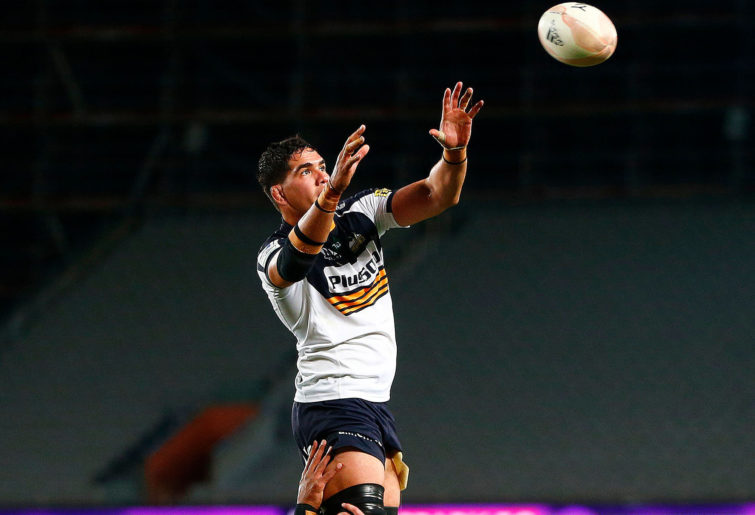The Brumbies have a perception issue only they can address
It was the moment the Brumbies had to realise they have a problem.
No matter how much work they’d been doing in the week leading up to the match with the Blues, trying to find the improvements they desperately needed to spark their trans-Tasman campaign, it had to have dawned on them that something bigger was an issue.
Fourteen minutes in, having pinched a Blues lineout throw on halfway just a minute earlier, the Brumbies had a lineout throw roughly 30 metres out from their line on the south-western corner of Eden Park.
Lock Darcy Swain jumped at number four in a five-man set-up, lifted quickly and cleanly by Allan Ala’alatoa behind him and ex-Western Force backrower Henry Stowers in front. Swain took the somewhat-contested ball at the top and was looking to initiate transfer of the ball to Tom Cusack as he came back to earth.
Simultaneously as Swain’s feet hit the ground, the lifters and Nick Frost had already formed the maul around Cusack as he took the ball cleanly. The maul edged forward about five metres, and just as hooker Connal McInerney arrived to join behind Cusack, referee Damon Murphy let rip with the whistle.
The Brumbies forwards all then switched their faces to stunned, as they realised Murphy was pointing to the Blues.
“Long-arm transfer. You must stay connected,” he said, pointing to one of the Brumbies forwards. “Stay connected to the lifter,” he added.
Cue silence in the Sky Sport commentary box.
“I have no idea what that means,” the special comments man said, a former Blues forward whose name escapes me. Not James Parsons, the other bloke.
“I don’t think Darcy Swain does either, the way he’s shaking his head,” lead commentator Rikki Swannell added. “Technical penalty to the Blues.”

Darcy Swain. (Photo by Phil Walter/Getty Images)
Dan McKellar’s face gave nothing away as they cut to the shot of the coaches box, while beside him, Laurie Fisher’s ever-present Brumbies bucket hat did just enough to cover his eyes as his face remains motionless.
The Brumbies walked back the required ten metres, and Swain could be seen saying something to his teammates as he shook his head again.
“Long-arm transfer,” Murphy said again.
Otere Black kicked to the corner, Kurt Eklund found Josh Goodhue in the middle of the Blues maul, they drove forward a few metres, and Eklund got his hands on the ball before barging over for the first try of the match.
Except Goodhue fluffed his transfer even worse than Swain did. As the Blues’ forwards formed the maul around him, he was still coming down, and so his arms carrying the ball ended up on top of the maul.
When Eklund took the ball from Goodhue, he wasn’t in any way attached to anybody in the maul.
If Swain was rightly pinged for the long-arm transfer – and I’ll get onto this – then Goodhue’s was even worse.
Murphy didn’t see it that way, obviously, and worked his way into position to award the try as soon as Eklund got the ball down with Dalton Papali’i driving behind him.
But what is a long-arm transfer?
Well, for one, it doesn’t actually exist in the Laws of Rugby as a thing. There’s no mention of it in Law 16 around the maul, and there’s no mention of it in Law 18 around the lineout, either.
But it did become a thing in January 2016 in the southern hemisphere, and you will find it a law application guideline around the maul.
“The ball can be moved backwards hand-to-hand once the maul has formed. A player is not allowed to move/slide backwards in the maul when the player is in possession of the ball and the ripper needs to stay in contact with the jumper until they have transferred the ball.”
The key words here are “…and the ripper needs to stay in contact with the jumper until they have transferred the ball,” and with examples in the World Rugby guideline, there are references to long placements and transfers.
So even though Murphy told Tom Cusack, I presume, “stay connected to the lifter,” I think he actually meant that Cusack as the ripper must stay bound to Swain. And looking back over it several times while putting this together, I do think he got it right.
The only problem being that he then very clearly missed Goodhue doing exactly the same thing much more visibly only a minute later.
But this isn’t about refereeing consistency – that’s a whole other chapter, never mind a single column on a Tuesday.
No, this is more that the Brumbies have probably been doing this same thing for some time now, and one way or the other, it had been brought to Damon Murphy’s attention.

Brumbies coach Dan McKellar. (Photo by Kai Schwoerer/Getty Images)
And whether that was the Blues having a pre-game chat, or whether the referees themselves identified it during reviews as a possible infringement to look out for, or even if it was opposing coaches raising the matter in weeks previous, none of that matters.
What matters is that Murphy had it in his mind to look for it, and suddenly he recognised it.
Rewatching the few lineouts immediately preceding the infringement, there’s a pattern too.
In the 13th minute, in pinching the Blues’ lineout, Swain offloaded to Cusack with extended arms all while he was still in the air.
In the 11th minute, Frost won a five-metre attacking lineout cleanly, but let the maul form around him before transferring the ball underneath bodies as McInerney arrived.
A minute before that, Swain won another attacking lineout around twenty metres out, and on review he’s guilty of a long-arm transfer to Cusack again, who like Eklund really didn’t look like he bound to either Swain as the jumper, or to the forming maul.
I’m not going to profess to know what goes through a referee’s mind, but it’s entirely plausible that what Damon Murphy saw in the tenth minute gave him the reminder to keep an eye out for what he then penalised four minutes later. And didn’t penalise again for the rest of the match, for what it’s worth.
Essentially, and even if technically they are in breach of the 2016 guideline, the Brumbies are more guilty of presenting the wrong picture to the referee. And this is where they can address the perceptions around the way they play.
The perception is clearly there. In Super Rugby AU, the Brumbies had the best lineout success rate, but were also the most penalised of the five Australian sides. Again, in Super Rugby Trans-Tasman, the Brumbies have the best lineout success rate, though both they and the Blues are in the bottom half of teams for penalties conceded.
In AU, Swain and Cadeyrn Neville were in the top five most penalised players in the competition.
The Brumbies did enjoy some scrum success against the Blues on the weekend, and even though Scott Sio was the most penalised player in Trans-Tasman coming into Round 3, their front row and scrum coach Dan Palmer have been working overtime in recent weeks to change the picture they’re presenting.
Up to the point they kicked off in the 39th minute and found themselves chasing – but not tackling – Finlay Christie for 70 metres, they were controlling this game well. Their second half and one minute let down what had been a strong showing to that point.
They now have a chance with two home games to save some face in Super Rugby Trans-Tasman, but the easiest way they can do that is by helping themselves.
They can’t control how referees perceive their actions, but they can control the picture they put forward for perception and refereeing judgement.
Original source: https://www.theroar.com.au/2021/06/01/the-brumbies-have-a-perception-issue-only-they-can-address/
https://therugbystore.com.au/the-brumbies-have-a-perception-issue-only-they-can-address/
Comments
Post a Comment